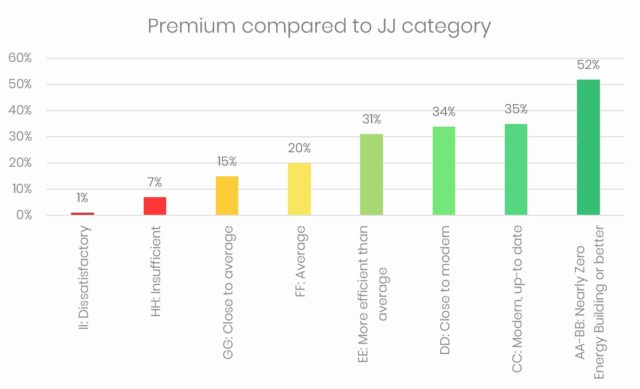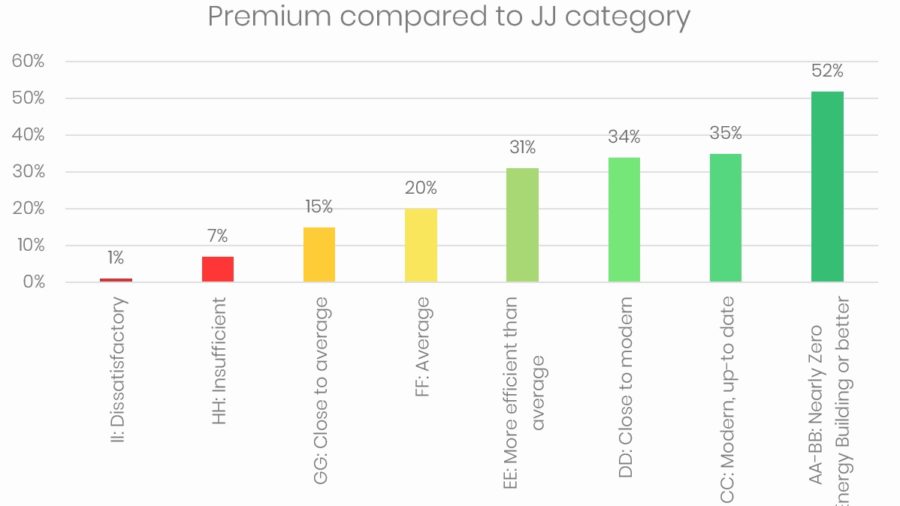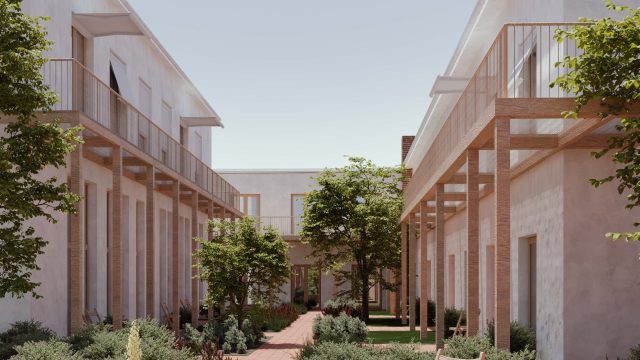Hungarian experts led by the Hungarian Institute for Energy Efficiency have conducted a unique study to investigate how the value of residential property changes according to its energy efficiency rating. By combining databases from the Hungarian Central Statistical Office, the National Tax Office and the Lechner Knowledge Centre, they examined the factors affecting the market price of 8,000 detached houses.
The results show that homes with a near-zero energy demand (energy class BB) are worth more than 50% more than those with similar energy needs but with the worst energy performance (JJ). If we upgrade our average (FF) family house, it is expected to be worth 20% more on the housing market.
The research was carried out as part of the RenoHUb project.
The research
The aim of the research was to examine the impact of energy renovation on the value of domestic residential property, using the most comprehensive and reliable database available. The target group of the research were family houses, because their energy refurbishment, in contrast to the condominium segment, represents a significantly greater innovation challenge due to their dominant market share and their uniqueness.
A new database of national importance was created for the purpose of the research: The housing transaction dataset of single-family houses sold in Hungary in 2019 (which contains statistically relevant data on the value of the property, recorded in the post-sale tax procedure received from the Hungarian Central Statistical Office (KSH) by the NAV) was linked to the energy certification data made available by the Lechner Knowledge Centre, supplemented with building and housing data from the 2011 KSH census, based on the addresses and parcel numbers. The survey was only carried out for addresses that were undoubtedly identical (N=8007).
The first step of the research used a linear regression model to investigate the extent to which the attributable building characteristics determine the energy efficiency of a property. In a second step, we examined how the market prices the benefits of energy retrofitting for detached houses. Linear regression modelling was carried out to better isolate the impact of factors that shape house prices. Among the factors determining the value of the property, we examined the floor area of the property, its location (region, metropolitan area, agglomeration, district level), the access time to the regional centre and Budapest, the area of the plot in relation to the median of the municipality category, the year of construction and renovation, the time of the property transaction (2019 Q1-4), the condition of the property, masonry, number of rooms, etc. The full research material is available in our publication in the KSH Statistical Review.
Results
We have shown on our dataset that, controlling for location and property characteristics, there is a significant increase (premium) in the price of detached houses as a result of higher energy rating. While family houses with a good energy rating show a premium of roughly 15-20% compared to the ‘average’ FF category of the requirement system, there is a decrease (discount) of almost twenty percent in the price of properties with a lower energy rating. These differences are close to the upper end of the results of similar international calculations, which measure a difference of 5-10% between categories. We cannot compare the results more precisely due to the different energy certification systems in different countries. There was not always a significant difference between adjacent categories in our research.
Our results confirm that there is a premium in the price of more energy-efficient family houses, i.e. that modernisation renovation can lead to price increases. We find that the price premium for the highest categories is higher by more than 50%, but moving up only one or two price categories compared to the worst ones already implies a detectable price premium. The statistical results also suggest that, compared to smaller interventions, larger upgrades may have a relatively better return in terms of increase in property value.

The higher the local housing market price level, the more attractive energy efficiency investments may be in terms of expected value gains. Where market prices are low, the cost of renovation can easily exceed the expected increase in value. A detailed analysis of prices and the costs of individual renovations could be the subject of further research, but for the time being it is worth noting that in the absence of additional incentives and/or subsidies in areas with lower property prices, energy efficiency investments may not be implemented.
The basic trends are the same for municipalities, county seats and cities: the price of buildings with good energy efficiency is higher, but as one moves from average to lower energy performance, no further price decrease can be observed. The exception is Budapest, where there is no clear correlation: the location of the property plays a greater role in the price, so that properties in older, prestigious areas are more expensive even if their energy quality is poor.
By subscribing on the RenoHUb website to the RenoHUb newsletter, you can keep up to date not only on the progress and partial results of the project, but also on related conferences and events.
This article is based on the study published in the Statistical Review, Volume 99, Issue 10: Antal Ertl, Áron Horváth, Gergely Mónus, Fanni Sáfián, Judit Székely “The relationship between energy characteristics and house prices”.


